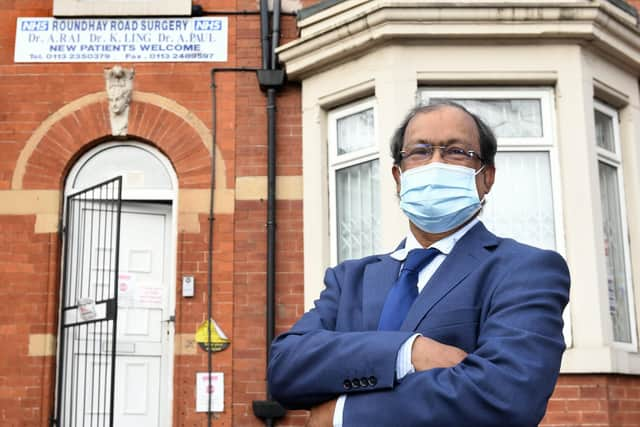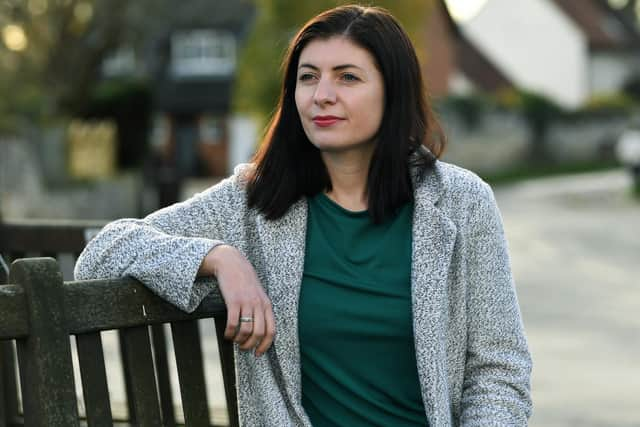Coronavirus pandemic should be the trigger for making real changes to tackling health inequality says Harehills GP
and live on Freeview channel 276
Dr Amal Paul has been working in Leeds communities for more than 25 years and says it is only in the aftermath of the first wave of the coronavirus pandemic that health professionals have "had their eyes opened" to the reality of health inequality.
He says more needs to be done to understand why there are barriers and challenges to accessing and providing health-care in deprived wards, such as Harehills, and that there needs to be acknowledgement from top level directors that previous projects set up to tackle health inequalities just don't work.
Advertisement
Hide AdAdvertisement
Hide AdAs the Yorkshire Evening Post looks again at the health inequalities and life expectancy differences that can be found between wards in the city that are just a few miles apart, Dr Paul, of Roundhay Road surgery, says: "The whole system needs to be revamped. The approach should be modified if they really want to make a change. This is not a one size fits all."


The GP's comments come as he reveals more information behind the widely known statistic that the life expectancy of someone from Harehillls is around 70 years-old and that for someone from Bramhope it is 80 years of age.
Further research into this shows that people in Harehills can expect to be in poor health for 23 years of their lives, whereas in Bramhope, people experience an average of 12 years of poor health - making someone from Harehills poorly for 21 years more then them.
Cancer care statistics, when it comes to measures such as cervical smears, mammograms and bowel cancer screening, stand at 80 per cent for north Leeds. However, the take up in Harehills is, on average, 50 to 60 per cent.
Advertisement
Hide AdAdvertisement
Hide AdDr Paul said: "There is an opportunity there, the services are there, people say they offer equal services but they don't see how much the service is not taken by the people for whom it is devised."


There are several reasons for this he assumes.
"People have poor health awareness, they don't understand the effect if diabetes gets worse, they get obese and heart disease. They don't understand until they face the problem. There are different health taboos, some still believe diabetes is not a disease, it is an action of evil.
"Some don't get up until midday. Women are dependent on the male person to take them to the doctor but half of that day is gone. When it comes to transport, most don't have cars and have to use public transport. In Harehills we struggle to recruit GPs and health care people due to language, culture and deprivation.
"All of these things restrict access, they are all compounding factors."
Advertisement
Hide AdAdvertisement
Hide AdHe added that one of the other major health issues where people in Harehills are reluctant to seek help is mental health and post natal depression.
The extra years that people in Harehills spend with these conditions, or suffering in silence compared to north Leeds, is something that has not really been explored.
Dr Paul says there also needs to be a systematic change within the NHS about how delivering medical care in places like Harehills is done.
Concerted efforts at Roundhay Road surgery have got those cancer screening figures between 70 and 80 per cent and have been achieved by recruiting multi-lingual members of staff and actively contacting patients about screening opportunities.
Advertisement
Hide AdAdvertisement
Hide AdBut, he recalled a conversation five years ago with a Care Quality Commission inspector who used to work in Harehills but only lasted for two weeks.
Dr Paul said: "They said they would never go back and don't know how I work there. On the other hand we have a practice nurse who is English and does not speak any Asian languages, but, she has been here for ten years and is one of the most loved and respected members of staff by patients. She is an example of how patient relationships can be adapted.
"The whole structure needs to understand the needs of Harehills are different to north Leeds. There is some lack of understanding but I believe that COVID just opened our eyes and people are more understanding now. There is some willingness, especially from Leeds CCG and high level people who make the decisions, to step in and make the changes.
"This moment should be continued and should not be a temporary one."
Advertisement
Hide AdAdvertisement
Hide AdIt comes as the West Yorkshire and Harrogate Health Care Partnership announces a new Targeted Prevention Grant Fund worth £100 000 to help reduce the gap in health inequalities across the area and also the effects of COVID-19.
It is aimed at community level projects across Leeds, Bradford, Harrogate, Kirkless and Calderdale and follows a similar scheme in the summer where 12 pots of money worth between £25,000 and £50,000 were made available.
There were 80 bids for that money and after feedback that some groups did not have the time or expertise to fill out the forms, this time help is being given to make the applications.
Some projects which benefitted were Sikh Elders who have educated Punjabi speaking members about COVID restrictions and guidance, and, Halifax based Women's Activity Centre which works with South Asian women over 50 at risk of being isolated. It has also started a new diabetes programme.
Advertisement
Hide AdAdvertisement
Hide AdSarah Smith is public health consultant for the Partnership and says the level of applicants reflects the need for such schemes.
She said: "It really demonstrated that need and we could have funded many more if we had money and resources. They were really good applications and we learned a lot about what the local need is and how they have supported people during the pandemic from a community level."
The Partnership and the NHS are listening more to what needs are at community level and is undertaking evaluation work to be shared across the Partnership so it can learn from ideas at grassroots level - whilst not widening inequality gaps.
She added: "There are certain things that have changed and will continue to be different. One is accessing care digitally and that has sped up but some people don't have access to that and we need to be mindful of that so we are not building in additional inequalities.
Advertisement
Hide AdAdvertisement
Hide Ad"We have to bear in mind the impact of mental health and wellbeing and the long term impact of that, it will not go away as soon as the pandemic does. We need to move more into prevention and community work which means services meet the cultural, social and religious needs of people accessing them.
"One project we are looking at is suicide rates among South Asians and stigmas and barriers around mental health services. If we don't understand it, it is very hard to make these changes."
Ms Smith said there was a need across the system to evaluate how it understands inequality.
She added: "Part of that is looking at data and knowing the inequalities exist and understanding why. Is that because people can't access health care or because there are structural issues? Part is talking to community groups, part is making sure leadership is reflective of the population and diverse and making decisions that are more reflective of the population."